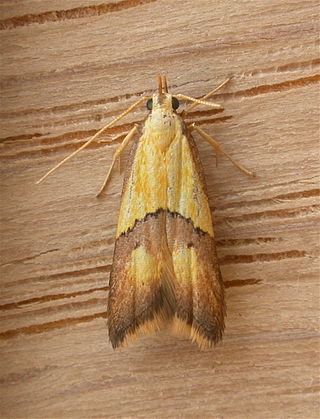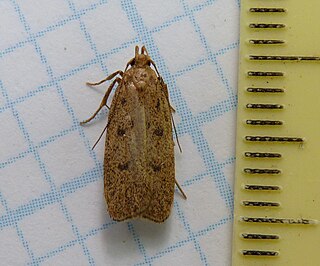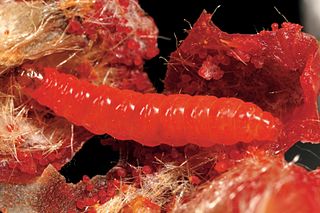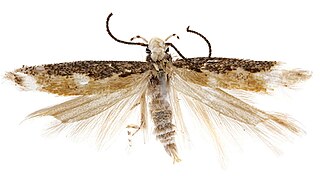
The Lecithoceridae, or long-horned moths, are a family of small moths described by Simon Le Marchand in 1947. Although lecithocerids are found throughout the world, the great majority are found in the Indomalayan realm and the southern part of the Palaearctic realm.

Crambinae is a large subfamily of the lepidopteran family Crambidae, the crambid snout moths. It currently includes over 1,800 species worldwide. The larvae are root feeders or stem borers, mostly on grasses. A few species are pests of sod grasses, maize, sugar cane, rice, and other Poaceae. The monophyly of this group is supported by the structure of the tympanal organs and the phallus attached medially to the juxta, as well as genetic analyses.

Anacampsis is a worldwide genus of moth with most found in the nearctic and neotropical regions. It is in the family Gelechiidae. The larvae feed on a range of deciduous trees and shrubs in a rolled or folded leaf, or spun shoot.

Anarsia is a genus of moths in the family Gelechiidae.

Aristotelia is a genus of moths in the family Gelechiidae. Well-known species are food plant specialists, and diverse hosts are used – Salicaceae, Solanaceae, Rosaceae, Fagaceae, Fabaceae, Asteraceae.

Dichomeris is a genus of moths in the family Gelechiidae erected by Jacob Hübner in 1818.

Helcystogramma is a genus of moths in the family Gelechiidae. The genus was erected by Philipp Christoph Zeller in 1877.

Hypatima is a genus of the twirler moth family (Gelechiidae). Among these, it belongs to a distinct lineage, which is variously treated as tribe Chelariini in subfamilies Dichomeridinae, Gelechiinae, or even Pexicopiinae, and historically was considered a subfamily in its own right, Chelariinae. Of this lineage, Hypatima – under its junior synonym Chelaria – is the type genus. This genus has numerous species, but its exact limits are not quite clear. This genus occurs mainly in the Southern Hemisphere, though one of the better-known species is the only member of this genus native to Europe, the lobster-clawed moth.

Syncopacma is a genus of moths in the family Gelechiidae.

Ethmia is a large genus of small moths. It is the type genus of the gelechioid family Ethmiidae, which is sometimes included in Elachistidae or Oecophoridae as subfamily.

The Depressariinae – sometimes spelled "Depressiinae" in error – are a subfamily of moths in the superfamily Gelechioidea. Like their relatives therein, their exact relationships are not yet very well resolved. It has been considered part of family Elachistidae sensu lato or included in an expanded Oecophoridae. In modern classifications they are treated as the distinct gelechioid family Depressariidae.

The Oecophorinae are the nominate subfamily of moths in the concealer moth family (Oecophoridae). They are part of the insufficiently studied superfamily Gelechioidea, and like their relatives, the circumscription of this taxon is disputed.

The Symmocinae are a subfamily of moths in the superfamily Gelechioidea. These small moths are found mainly in the Palearctic and Africa.

Acrocercops is a genus of moths in the family Gracillariidae.

Agonopterix is a moth genus of the superfamily Gelechioidea. It is placed in the family Depressariidae, which was often – particularly in older treatments – considered a subfamily of the Oecophoridae or included in the Elachistidae.

Dichomeridinae is a subfamily of moths in the family Gelechiidae.

Carposina is a genus of moths in the Carposinidae family.

Gelechiinae is a subfamily of moths in the family Gelechiidae. It was described by Henry Tibbats Stainton in 1854.

Anomologinae is a subfamily of moths in the family Gelechiidae.
Apatetrinae is a subfamily of moths in the family Gelechiidae. The subfamily was described by Edward Meyrick in 1947.


















